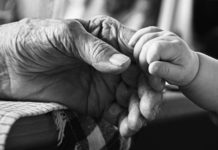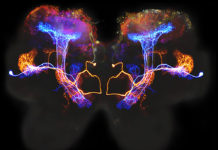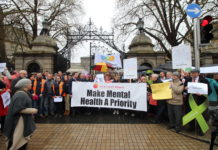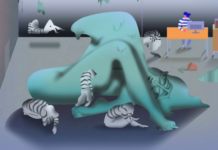Research Finds Parents’ Trauma May Impact Children’s Health
Study uncovers some of the intergenerational consequences of adverse childhood experiences (ACEs).
Purpose is Inherently Divorced From Consensual Reality
Imagine being able to live harmoniously amongst others without fear. I cannot. Cannot imagine it even a little bit. What can be created for people in my camp? People who are sensitive and had so much trauma in childhood that life among others is highly stressful, scary and worrisome? I'm allowing myself sanctuary-time alone, quiet time, time to write… yet… will things ever be different? Will I ever find my niche in this world, where I feel safe and able, valued and worthwhile, loved, adored and comfortable? I have no idea.
Vail Place Focuses on Collective Work for Mental Health
Minn Post did a feature story last week on Vail Place, an alternative mental health treatment center run on a community “clubhouse” model where the nearly 900 members and staff work side by side to run the center’s activities. Vail Place was founded in Hopkins, Minnesota in the early eighties by mental health activists and family members as a community for psychosocial rehabilitation. “The work isn’t therapy,” a member explains. “It’s growth. It’s ‘I cans’ rather than ‘I can'ts.’ And that’s important for mental health and survival.”
Trauma, Memory, and Mental Health
In this episode of ABC Radio National's All In The Mind, Lynne Malcolm interviews three experts about the impact of trauma on our memory and mental health. One guest,...
Investigation Reveals Alarming ECT Practices in England
Audit of ECT usage, demographics, and adherence to guidelines and legislation raises concern over its continued use.
How to Integrate Culture into Mental Health Care
Researchers explore how culturally responsive services can create greater equity in mental health care.
Antidepressants Do Not Prevent Suicides, May Increase Risk
When the CDC released data revealing an increasing suicide rate in the US, some experts, speaking to major media outlets, speculated that the increase...
You Can Have Any Kind of Treatment You Want, Providing it’s Our Kind
Mental health nurse education supports institutional psychiatric practice in an insufficiently questioning way. Its formal curricula in universities are often undermined by the informal curricula of practice environments. As an institution, mental health nursing pays insufficient attention to both these issues because it is an arguably un-reflexive and rule-following discipline.
We Need Ecstasy and Cocaine in Place of Prozac and Xanax
From Aeon: While psychiatric drugs are often ineffective and can have serious side effects, there are many psychedelics and other illicit substances that have proven...
Study Confirms Higher Suicide Risk for Sexual Minority Adolescents
Researchers report that sexual minority adolescents have considered, planned, and attempted suicide substantially more than their heterosexual peers.
ASAN Condemns White House Autism Proclamation
The Autistic Self Advocacy Network has voiced opposition to the President's autism proclamation and participation in Autism Speaks' "Light it Up Blue" Campaign. The...
Digital Media Use Linked to Increase in ADHD Symptoms
Increased frequency of digital media use can increase symptoms of ADHD among adolescents, study finds.
Time to Abolish Psychiatric Diagnosis?
‘Diagnosing’ someone with a devastating label such as ‘schizophrenia’ or ‘personality disorder’ is one of the most damaging things one human being can do to another. Re-defining someone’s reality for them is the most insidious and the most devastating form of power we can use. It may be done with the best of intentions, but it is wrong - scientifically, professionally, and ethically. The DSM debate presents us with a unique opportunity to put some of this right, by working with service users towards a more helpful understanding of how and why they come to experience extreme forms of emotional distress.
High Job Strain Increases Risk of Mental Health Challenges
High job demands, low job control, and high job strain are associated with the development of a mental health issue at age 50.
Help Write a Psychiatric Survivor Manifesto
This is a summary compiled by people in the mental health civil rights movement. Some of us call ourselves psychiatric survivors; those who have survived psychiatric treatment, not the “illness.” Many of us have found scientific evidence and our own personal experiences showing that emotional distress is not an illness. We have found recovery using a variety of approaches and methods, but here are several concepts of hope and empowerment repeated in many of our personal stories.
Screening Instruments Do Not Reflect Individual Experiences of Depression
Researchers detect discrepancies between the language used to describe lived experiences of mental health and the language used in modern screening tools.
Psychosocially Oriented Psychologists Struggle Against the Medical Model
Interviews with psychosocially oriented psychologists demonstrate their experiences of discomfort with the hegemony of the medical model in their place of work and the conflicts that arise when they attempt to provide alternatives.
Snail’s Pace Race
I live a slow paced life. I meditate every morning, refuse to get a smart phone (yet), and it takes me generous amounts of time to do things. This isn't because I am “stupid” or slow to get things. Sometimes I wonder how others get so much done each day - yet the quality and vibration of what I do is unique. It needs time. How does this relate with psychiatric drugs? Psych drugs are rooted in impatience, urgency, emergency.
Understanding Madness as Revolution, Then Working Toward Peace
While some will frame Eleanor Longden’s story, told in her awesome TED video (which has now been viewed about 1/2 million times!), as the triumph of an individual struggling against “mental illness,” I believe the story might better be seen as a refutation of the whole “illness of the mind” metaphor, and as an indication of a desperate need for a new paradigm.
From Psychiatry and Psychotherapy’s Grand Delusion Toward Constructions of a Post-Therapeutic State
by Eugene Epstein, Manfred Wiesner, and Lothar Duda
Over the past 50 years, the psychiatric and psychotherapeutic discourses of the western first world have infiltrated...
Johann Hari Continues to Speak Out
Johann Hari, British journalist and author of the new book Lost Connections: Uncovering the Real Causes of Depression—and the Unexpected Solutions, continues to speak out...
Study Examines Women’s Experiences of Hearing Voices
An international group of researchers from multiple disciplines has published a historical, qualitative, and quantitative investigation into voice-hearing in women. The interdisciplinary project, freely available from Frontiers in Psychiatry, explores how sexism, exploitation, and oppression bear on women’s’ experiences of hearing voices.
Large German Anti-Stigma Campaign Shows Little Effect on Attitudes
“Overall, this study showed that the information and awareness campaign had almost no significant effects on the general public's attitudes toward people affected by either schizophrenia or depression,” the researchers, led by German medical sociologist Anna Makowski, wrote. “One could assume that deeply rooted convictions cannot be modified by rather time-limited and general activities targeted at the public.”
“The Curious Case of the Antidepressant, Anti-Anxiety Backyard Garden”
“My vegetable beds have even buoyed me through more acute stressors, such as my medical internship, my daughter’s departure for college, and a loved one’s cancer treatment,” writes Dr. Daphne Miller. Now neuroscientists are attempting to study the antidepressant effects of soil microbes in hopes of unlocking the secrets of a powerful mood enhancer.
One in Four Resident Physicians Suffer from Depression
A new study in JAMA reveals that, on average, 25% of beginning physicians meet the diagnostic criteria for major depression. In an accompanying editorial, Dr. Thomas Schwenk, added: "Everybody asks me, because of some of my prior studies, should we have more intense work in diagnosing depression in students? Of course, the answer is 'yes,' but how do you go about that without further stigmatizing them, further labeling them, further singling them out to even greater stigma? It's not just an issue of, 'Let's make better diagnoses and let's provide better treatment'; it’s more complicated than that."






















